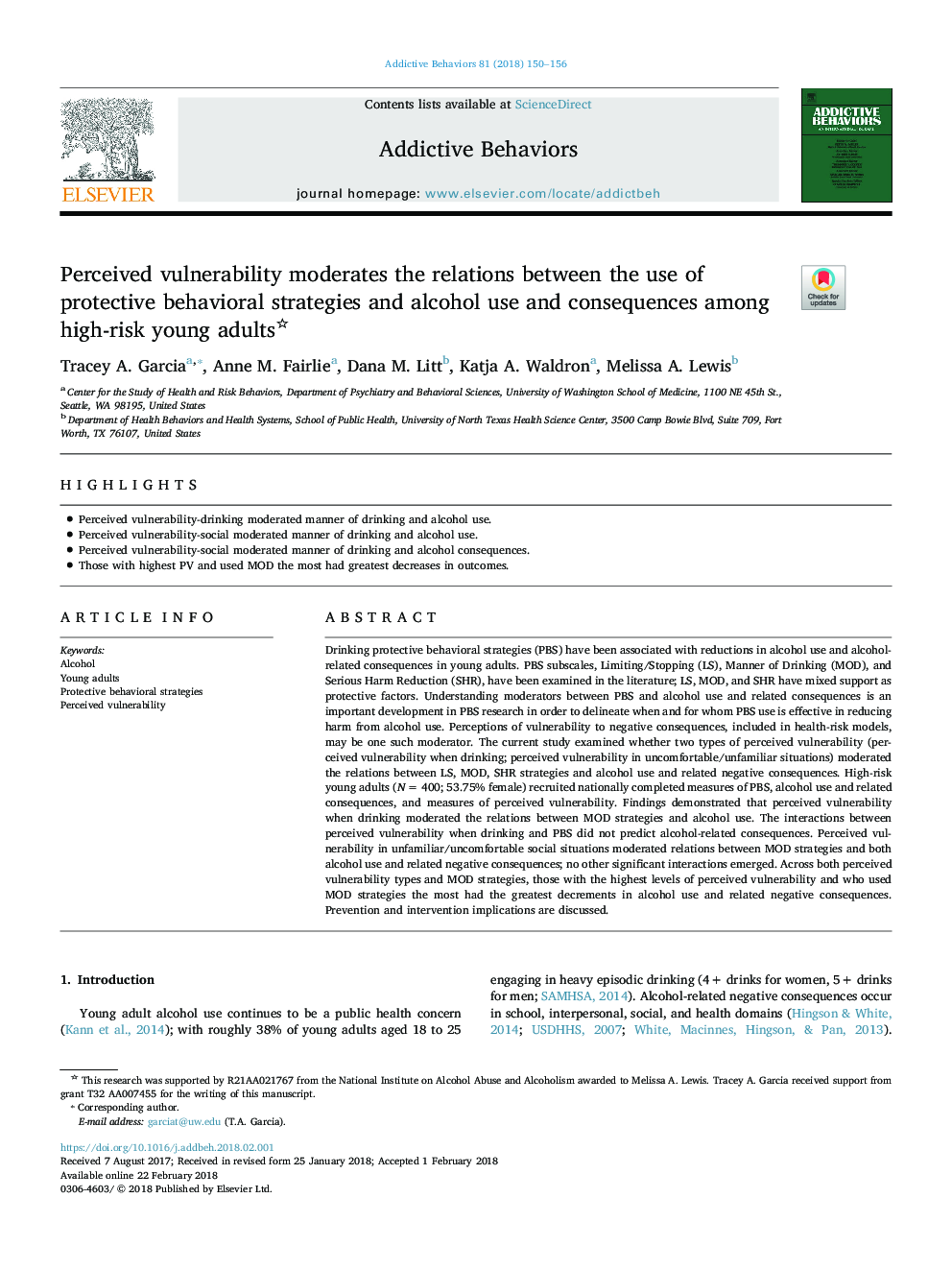| کد مقاله | کد نشریه | سال انتشار | مقاله انگلیسی | نسخه تمام متن |
|---|---|---|---|---|
| 7259247 | 1472490 | 2018 | 7 صفحه PDF | دانلود رایگان |
عنوان انگلیسی مقاله ISI
Perceived vulnerability moderates the relations between the use of protective behavioral strategies and alcohol use and consequences among high-risk young adults
ترجمه فارسی عنوان
آسیب پذیری درک شده روابط بین استفاده از استراتژی های رفتارهای محافظتی و مصرف الکل و پیامدهای آن در بین جوانان بالقوه را کاهش می دهد
دانلود مقاله + سفارش ترجمه
دانلود مقاله ISI انگلیسی
رایگان برای ایرانیان
کلمات کلیدی
الکل، جوانان، استراتژی های رفتاری محافظتی، آسیب پذیری درک،
موضوعات مرتبط
علوم زیستی و بیوفناوری
علم عصب شناسی
علوم اعصاب رفتاری
چکیده انگلیسی
Drinking protective behavioral strategies (PBS) have been associated with reductions in alcohol use and alcohol-related consequences in young adults. PBS subscales, Limiting/Stopping (LS), Manner of Drinking (MOD), and Serious Harm Reduction (SHR), have been examined in the literature; LS, MOD, and SHR have mixed support as protective factors. Understanding moderators between PBS and alcohol use and related consequences is an important development in PBS research in order to delineate when and for whom PBS use is effective in reducing harm from alcohol use. Perceptions of vulnerability to negative consequences, included in health-risk models, may be one such moderator. The current study examined whether two types of perceived vulnerability (perceived vulnerability when drinking; perceived vulnerability in uncomfortable/unfamiliar situations) moderated the relations between LS, MOD, SHR strategies and alcohol use and related negative consequences. High-risk young adults (Nâ¯=â¯400; 53.75% female) recruited nationally completed measures of PBS, alcohol use and related consequences, and measures of perceived vulnerability. Findings demonstrated that perceived vulnerability when drinking moderated the relations between MOD strategies and alcohol use. The interactions between perceived vulnerability when drinking and PBS did not predict alcohol-related consequences. Perceived vulnerability in unfamiliar/uncomfortable social situations moderated relations between MOD strategies and both alcohol use and related negative consequences; no other significant interactions emerged. Across both perceived vulnerability types and MOD strategies, those with the highest levels of perceived vulnerability and who used MOD strategies the most had the greatest decrements in alcohol use and related negative consequences. Prevention and intervention implications are discussed.
ناشر
Database: Elsevier - ScienceDirect (ساینس دایرکت)
Journal: Addictive Behaviors - Volume 81, June 2018, Pages 150-156
Journal: Addictive Behaviors - Volume 81, June 2018, Pages 150-156
نویسندگان
Tracey A. Garcia, Anne M. Fairlie, Dana M. Litt, Katja A. Waldron, Melissa A. Lewis,
